
By Aaron Tay, Head, Data Services

When you're doing a literature review search, it's goes without saying it is critical to use the right search terms to find what you're looking for. If you've done a lot of searching before, or if you've taken a class with a librarian, you've probably have seen this style of searching in academic databases.

Here's how it works:
- Define the main concepts in your research question
- Identify synonyms and related terms for each concept
- Group synonyms using OR within each concept block
- Combine concept blocks using AND
So, for example, you may have a topic
How does exercise affect mental health in teenagers?
Break them down into concepts for Exercise, Mental health, Teenager.
For each concept, you might consider the following Synonyms
| Concept | Synonyms |
|---|---|
| Exercise | exercise, physical activity, fitness, workout |
| Mental health | mental health, depression, anxiety, well-being |
| Teenagers | adolescents, teens, youth, young people |
You can then consider running the Boolean Search
(exercise OR "physical activity") AND (depression OR anxiety) AND (teenagers OR adolescents)
Constructing search in such a way is called using a "building block search strategy".
Going Deeper
The building block search strategy is simple enough in theory and if all you want to do is find a few relevant papers on the topic, this strategy can often work without too much effort or thinking.
But, if you're doing very deep research, you'll want to find almost every article on your topic. To do this, you need to make sure you don't miss anything important, even if it means looking through some results that aren't exactly what you need.
The technical term for a search that is comprehensive is a "high recall" or "high sensitivity" search. In comparison a search that minimizes irrelevant results in the search results is a "high precision" search. There is usually a trade-off between recall and precision.
The question then becomes
- How do you know what synonyms to add to ensure you don't miss out on relevant papers?
- More broadly, how do you know if the proposed Boolean search strategy is a good one?
Let's tackle the former first.
How do you know what Synonyms to add?
There are many ways to find synonyms, ranging from using tools to mine the full-text of relevant papers for potential terms, to using more recent AI methods like asking an LLM to suggest terms and/or using a "semantic search" (e.g. Elicit.com, Undermind.ai, SciSpace)
However, I will share with you a simple, yet powerful technique first popularised by systematic review researchers -- Bramer et.al (2018) to find synonyms to add.
Looking for synonyms for ESG
Let's say you're researching ESG (Environmental, Social, and Governance) and how it affects a company's reputation.
As such, one of the concepts you are looking for is ESG and let assume you are using the Scopus Database
Looking at some relevant documents on ESG you notice they tend to use the keywords ESG or Corporate Social Responsibility.
Here's what you should do in Scopus to help find candidate synonyms
#1 Run the following in Scopus Advanced Search to search for both keywords in Scopus
KEY ("corporate social responsibility") OR KEY ("ESG")

This will search the various "Keyword" fields in Scopus for both these terms. If you are unfamiliar with advanced Scopus Search see this help page
Additional Note
The original technique by Bramer et.al (2018) used databases like PubMed which has a universal thesaurus and one controlled keyword system but the keyword field in Scopus is a hybrid of different thesaurus terms.
Scopus KEY field is actually a combination of different Keyword systems including Author Keywords (AUTHKEY) and Index Terms (INDEXTERMS).
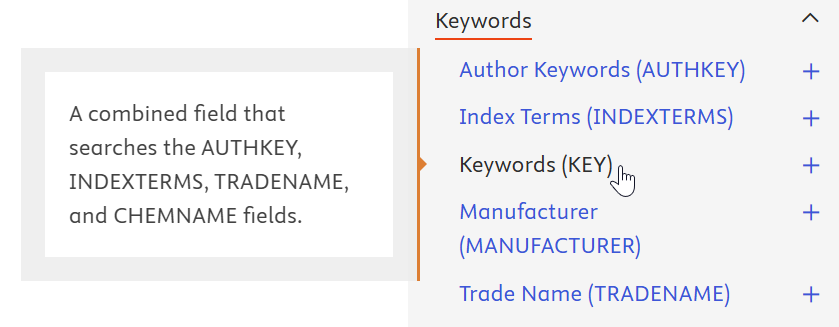
Author keywords are nonstandard terms selected by authors of the paper and are not consistent across papers, while indexed terms are controlled vocabularies with the same consistent term used across papers assigned by indexers.
Index Term systems in Scopus including GEOBASE Subject Index, Regional Index, EMTREE, MeSH (The last two are life science/medical related).
If you look at the full Scopus Record, you will also see "SciVal Topics". These are autogenerated and clustered "topics of prominence" and cannot be searched for directly in Scopus, even with the KEY field.
Still, the same method can be adapted and used for other examples.
#2 Run the same query but include the query terms ONLY in the title or abstract
TITLE-ABS ("corporate social responsibility") OR TITLE-ABS ("ESG")

Now to identify possible missed terms you can do two things.
#3 Run the query of #1 AND NOT #2
You can run the following search query in Scopus Advanced Search
( KEY ("corporate social responsibility") OR KEY ("ESG") ) AND NOT ( TITLE-ABS ("corporate social responsibility") OR TITLE-ABS ("ESG") )
Alternatively, you can use Scopus Search History to AND NOT both queries.
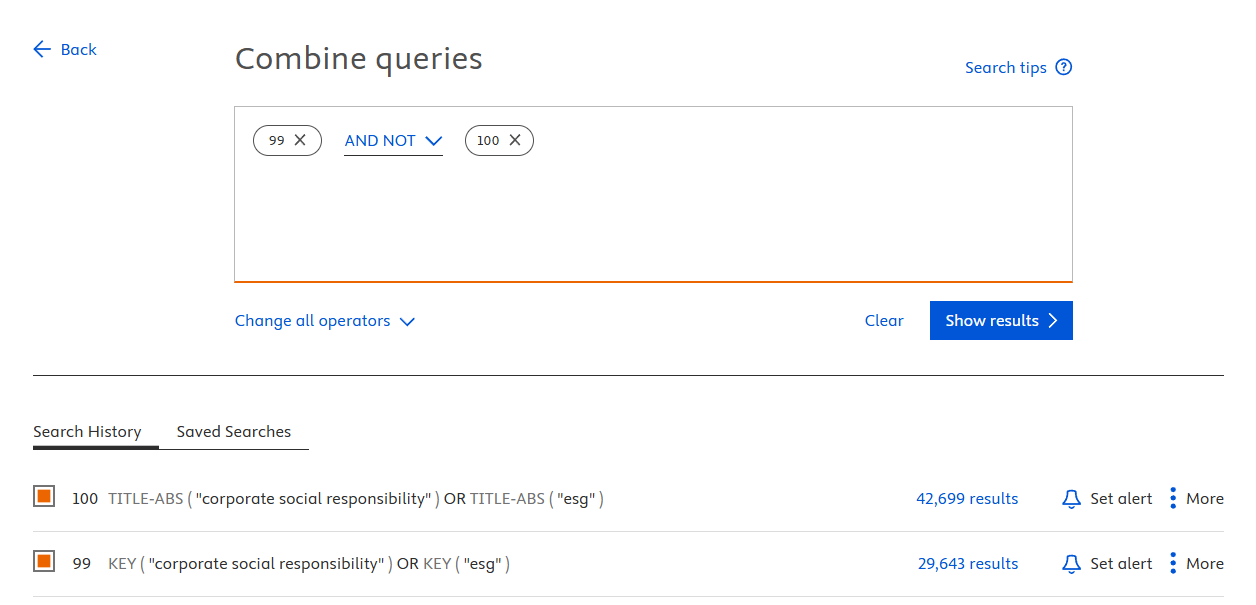
To clarify, what you are doing is looking at the set of documents which is indexed with the keyword terms you are interested in BUT do not have the same terms in title OR abstract.
Why this works: This is the key to finding hidden synonyms. If an article is tagged with "corporate social responsibility" or "ESG" as a keyword but doesn't use those exact phrases in the title or abstract, it means the article is about those topics but uses different terminology. By examining these articles, you can identify those alternative terms.
Example 1 -- Reminder to add abbreviations
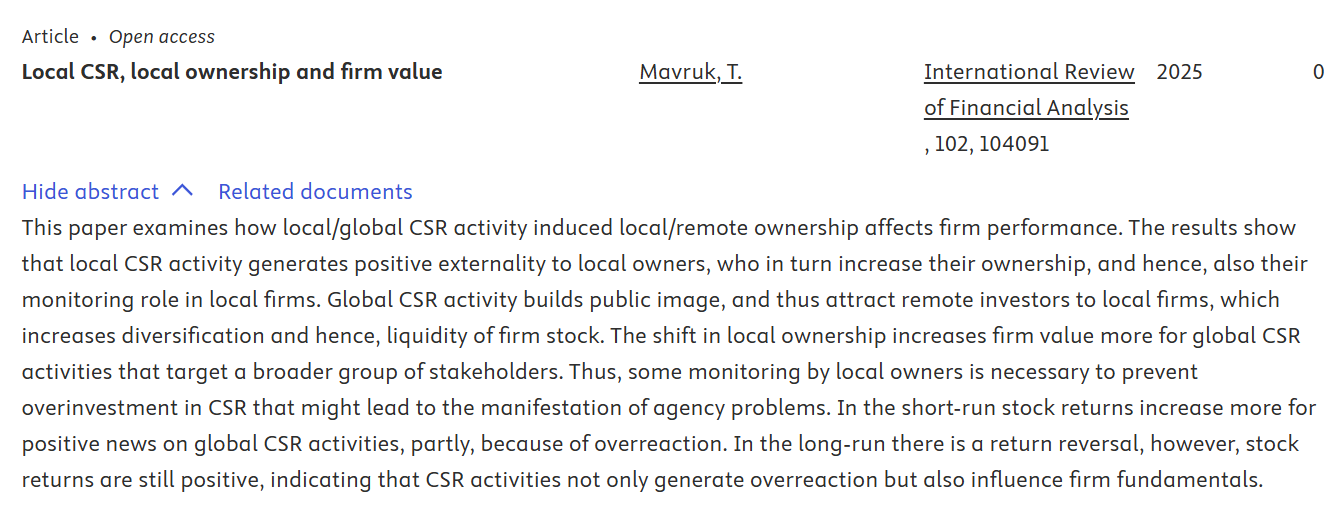
Looking at the result which was found by the author keyword "Corporate Social Responsibility", you realise you forgot to add the abbreviation of "CSR" for corporate social responsibility the title-abstract search!
By adding TITLE-ABS("CSR"), we may pick up additional relevant papers that has CSR in title or abstract but may not have "Corporate Social Responsibility" in the author keyword (because author keyword is assigned by authors without following any system and hence are not consistently applied and even controlled index terms might have errors).
Example 2 -- Is Sustainability reporting practices another synonym
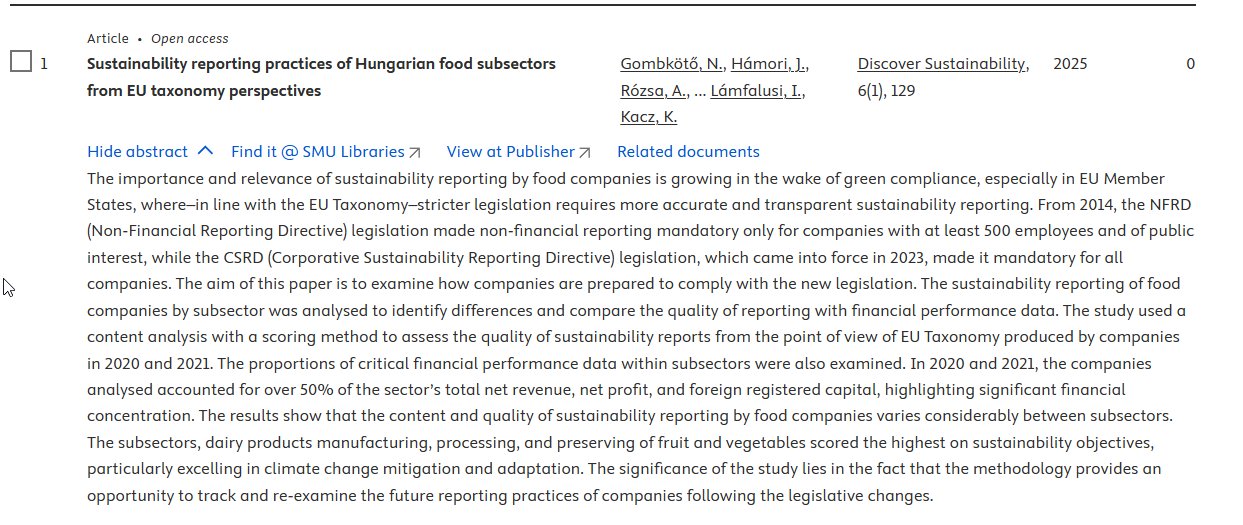
This example suggests that you might want to consider adding "Sustainability reporting practices."
You don't have to look through every example in this set and can stop when you are comfortable, or the suggested synonyms start to repeat.
Overall, based on this exercise, you may consider expanding the title-abstract matching part of your search to
TITLE-ABS ("corporate social responsibility") OR TITLE-ABS ("ESG") OR TITLE-ABS ("CSR") OR ("Sustainability reporting practice")
But let's also try the flip side of this approach by considering what are some documents that have title-abstract matching your terms but NOT in your KEY
#4 Run the query of #2 AND NOT #1 (optional)
( TITLE-ABS ("corporate social responsibility") OR TITLE-ABS ("ESG") ) AND NOT ( KEY ("corporate social responsibility") OR KEY ("ESG") )
Besides running the above string directly in Scopus Advanced search, you can also use Scopus Search History to AND NOT both queries.
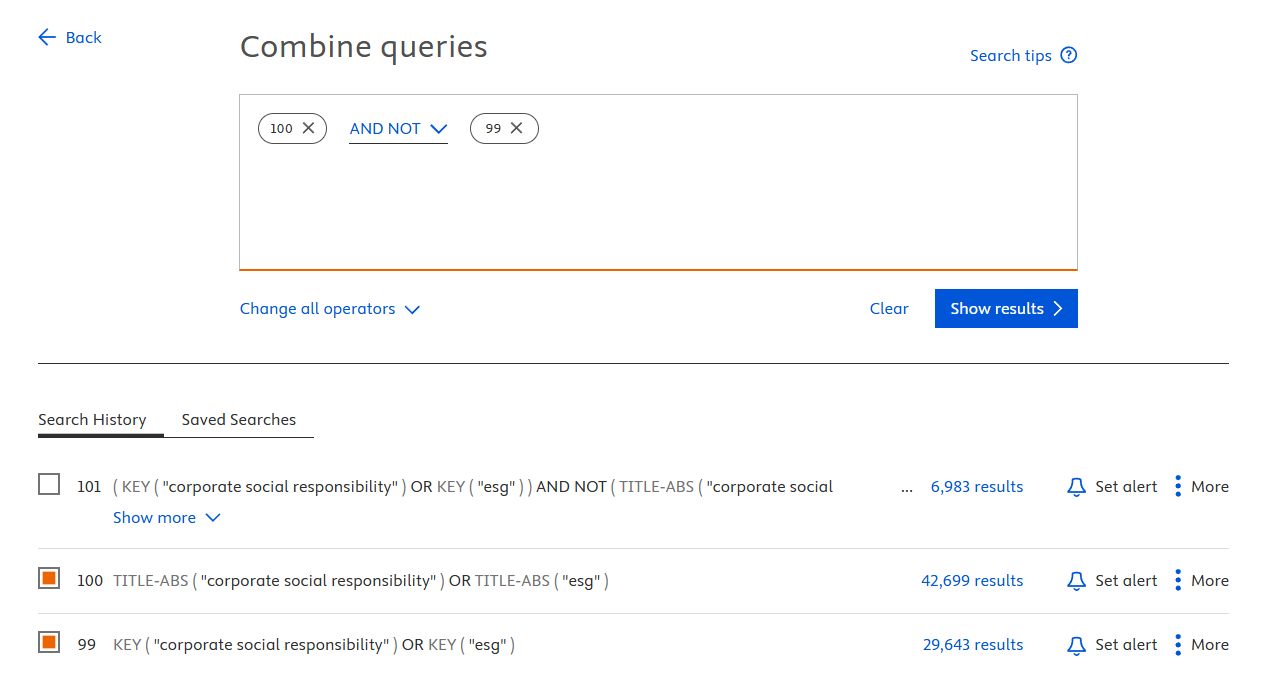
Again, not all of what is found may be relevant. Of those that are relevant, the idea here is to look at the Scopus full record to see if there are any keywords you should add to KEY().
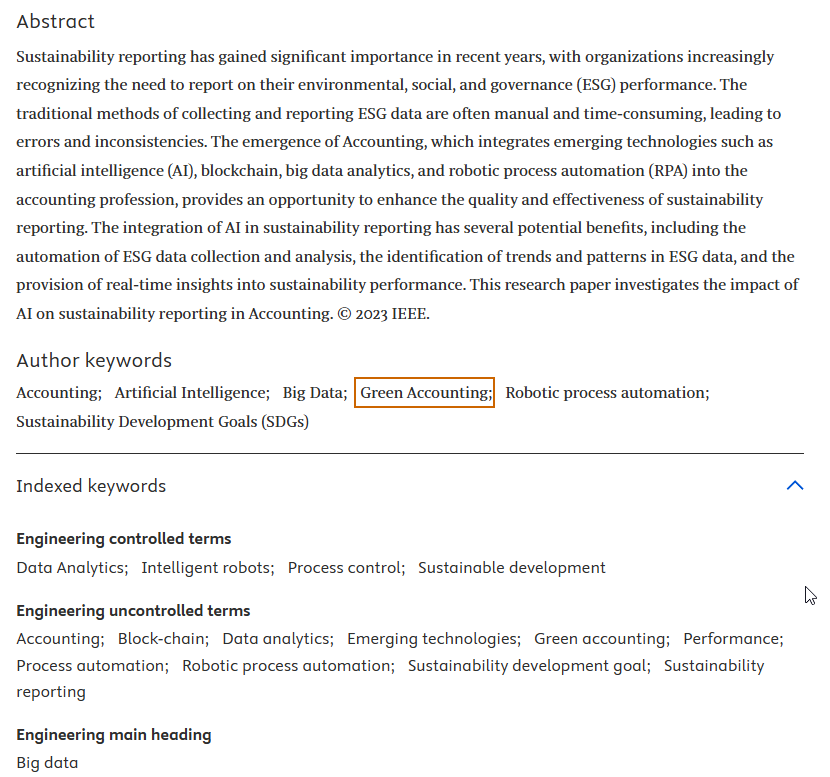
Why this works: This method helps you identify keywords that authors use when describing their work which may not be officially indexed. This can uncover more informal or emerging terminology.
In the above example, I spot a possible candidate synonym in "Green Accounting".
This method is far less effective than the earlier technique because many Scopus articles aren't indexed with keywords.
Conclusion
In this piece, I share with you one simple, elegant trick to look for possible synonyms that you might have missed. However, as you add these terms, your search may become too broad and imprecise, yielding an overwhelming number of results.
In my next blog post, I will share with you simple methods to estimate the overall quality of the boolean search string you are considering using.